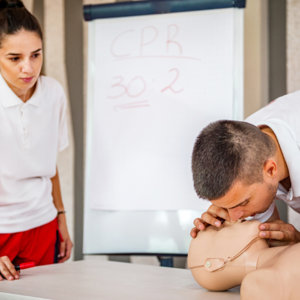
The Importance Knowing Life-Saving Techniques in the Aftermath of Natural Disasters
Natural disasters have devastating consequences on people, properties, and the environment. During disasters, many lives of people who have stopped breathing or lost consciousness have been saved by the timely use of CPR. Heightened emotions can block your critical skills and ability to think on your feet. In addition to staying calm under pressure, practicing life-saving skills can make a vast difference in a life-and-death situation. Knowing CPR and other life-saving techniques in the aftermath of natural disasters can significantly impact your community.
Immediate response to injuries: Natural disasters can result in a wide range of injuries, including trauma, breathing difficulties, and cardiac arrest. Knowledge of CPR and other life-saving techniques allows you to provide immediate aid to individuals injured or experiencing medical emergencies in the aftermath of a disaster.
Limited access to medical services: In the aftermath of a natural disaster, medical assistance may be limited or overwhelmed. By knowing CPR, you can provide critical life-saving interventions while waiting for professional help. This can make a significant difference in the survival and recovery of those affected.
Increased survival rates: Studies have shown that prompt CPR and early defibrillation can significantly improve survival rates for individuals experiencing cardiac arrest. By being trained in CPR, you can immediately initiate the necessary life-saving measures, increasing the chances of survival for victims in the aftermath of a disaster.
Ability to assist others: Natural disasters often result in widespread injuries and casualties. Knowing CPR and other life-saving techniques enables you to help others in need, whether a family member, a neighbor, or a stranger. Your skills can significantly impact their chances of survival and recovery.
Enhanced community resilience: The aftermath of a natural disaster can be challenging and chaotic. The overall resilience and response capacity can be improved by having individuals trained in CPR and other life-saving techniques within a community. This creates a network of support and increases the chances of survival for those affected by the disaster.
Psychological impact: Besides physical injuries, natural disasters can cause emotional distress and trauma. By providing immediate medical assistance and saving lives through CPR, you not only address the physical needs of individuals but also offer hope and support in a crisis. This can contribute to the psychological well-being and recovery of survivors.
Preparedness for unforeseen emergencies: Natural disasters can lead to unpredictable situations and secondary incidents, such as structural collapses, electrical hazards, or injuries caused by debris. Knowing CPR and other life-saving techniques equips you with the skills to respond effectively in various emergency scenarios, ensuring that you are prepared to handle unexpected situations that may arise during the aftermath of a disaster.
Remember, receiving proper training and certification in CPR and other life-saving techniques is important to ensure you have the necessary knowledge and skills. Regular practice and refresher courses are also recommended to maintain proficiency. By being prepared and knowledgeable, you can play a vital role in saving lives and providing critical assistance in the aftermath of natural disasters.

